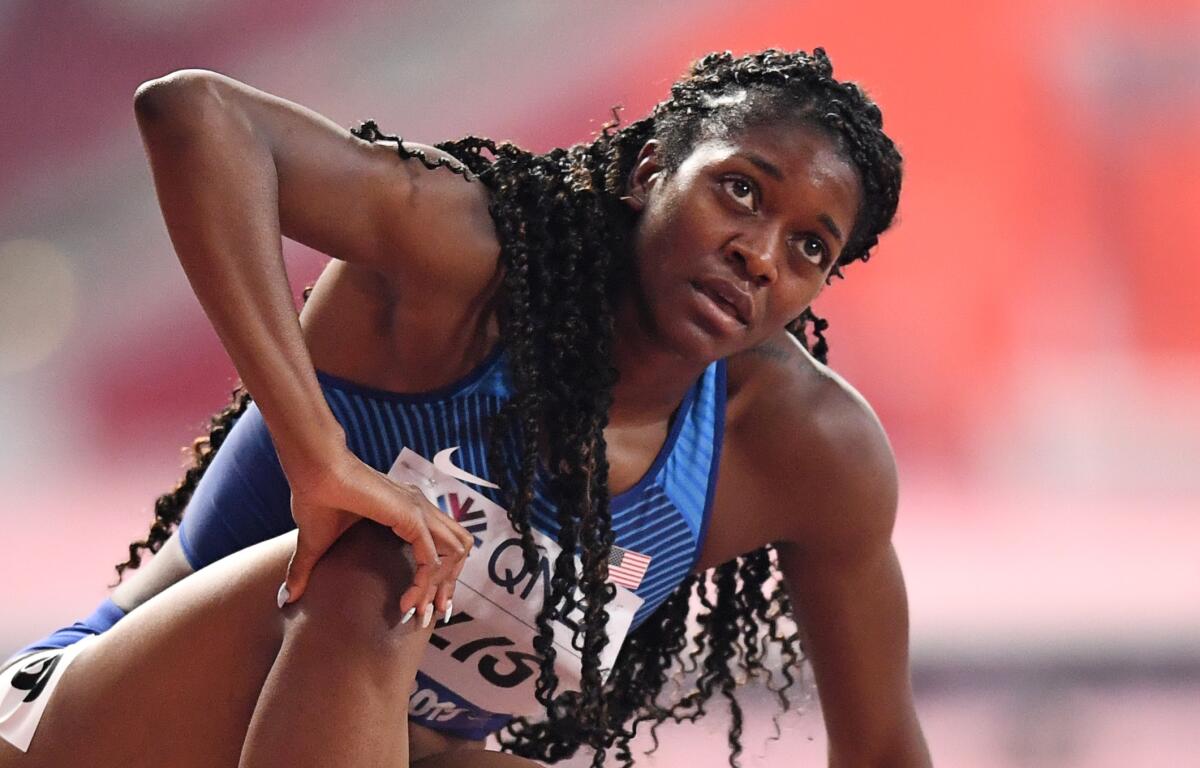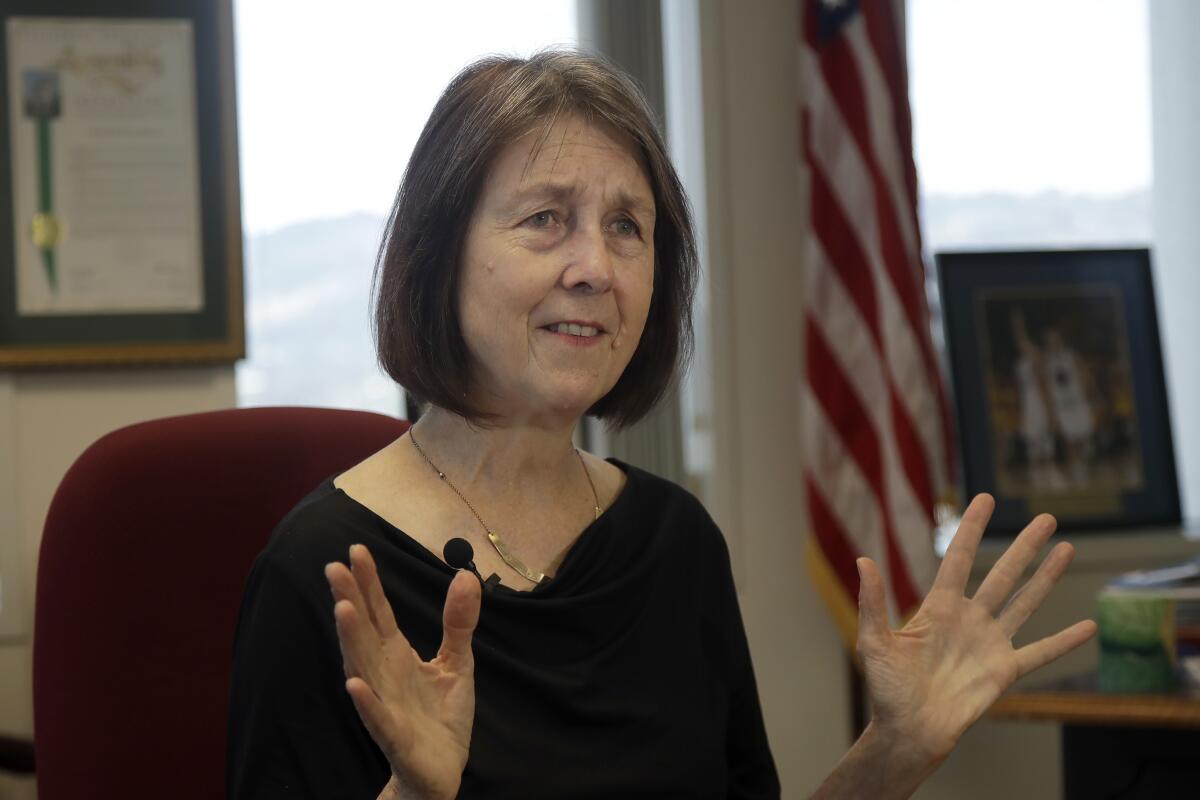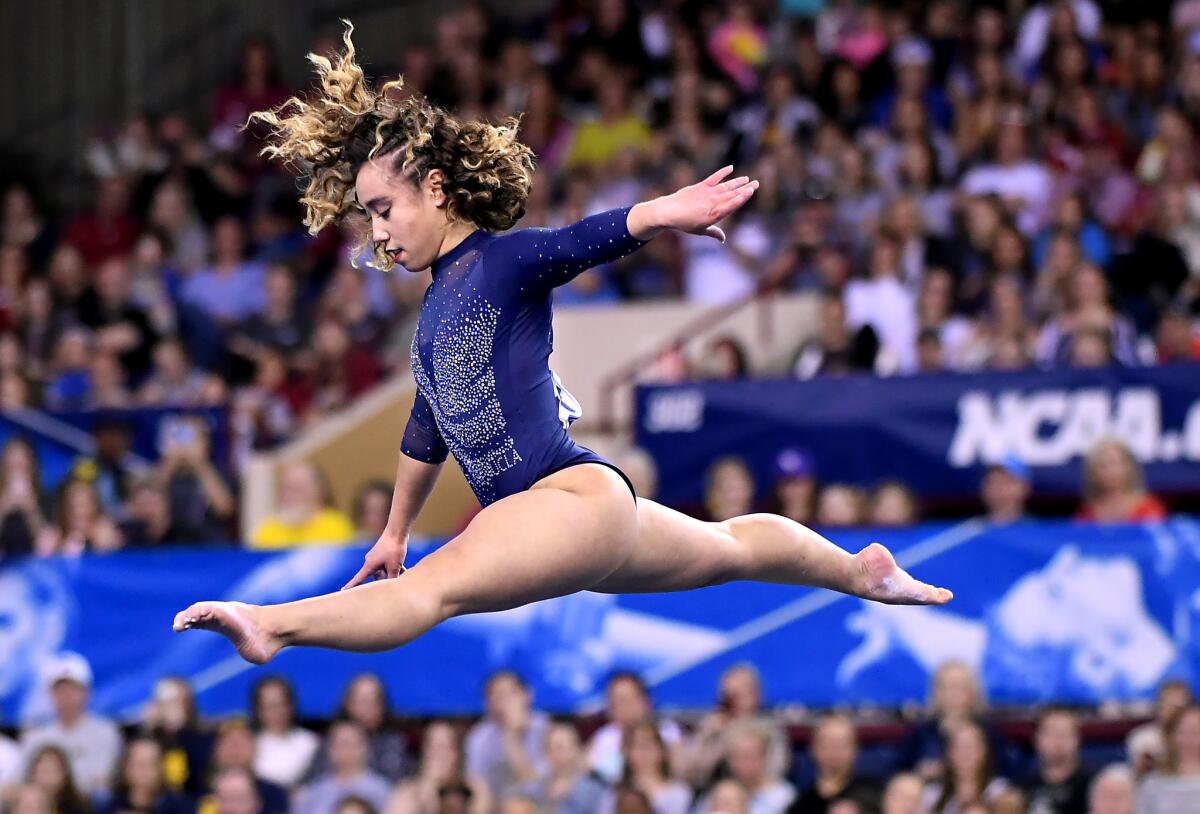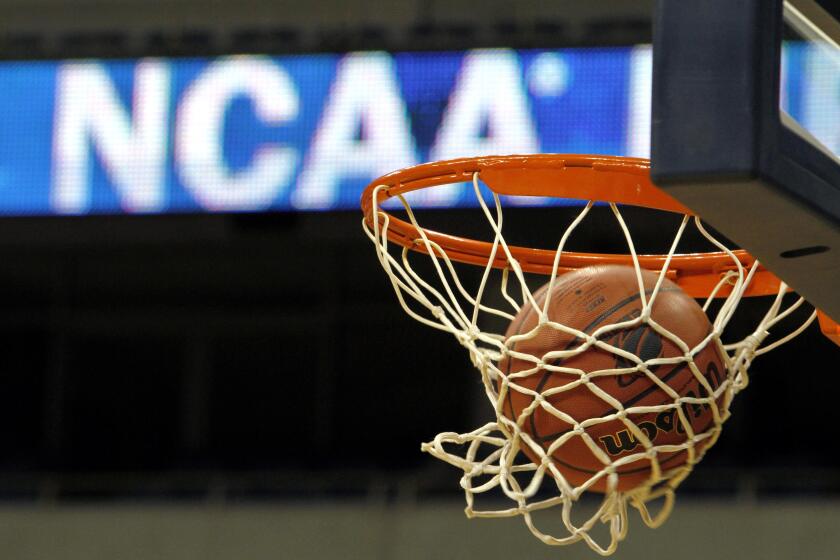Women respond to Pac-12 assertion that new California law would hurt female athletes
- Share via
In hindsight, it worked out very well for Kendall Ellis that she had become an expert penny pincher during her four years running track for USC.
Ellis had moved to Los Angeles from South Florida to pursue her education and dream of becoming an Olympic quarter-miler, and she brought uncommon discipline with her. Her freshman year, she saved up for a car. That meant she ate all her meals on her dining-hall meal plan and mostly didn’t go out on the weekends. As the years passed, she kept an eye on her future. After all, there were no guarantees that her athletic career would be profitable, no matter how much talent she possessed.
In all ways, she was the NCAA’s model “student-athlete.” Although when she had to avoid certain classes to fit her practice schedule, she wondered if the order of those words should be flipped.
Not many people outside of the track world would have known Ellis’ name or what she looked like. Not until the final race of her college career. USC needed a victory in the final event of the 2018 NCAA track and field championships — the 1,600-meter relay — to claim the team title. Ellis ran the anchor leg, and when she received the baton the Trojans were far behind. But she dug in, pulled herself into contention and somehow legged out an improbable first-place finish.

Kendall Ellis’ stunning performance at the 2018 NCAA championships.
Video of her gallop to glory went viral, getting air time on national sports TV programs. The attention flooded Ellis’ hardly used Instagram account with follow requests.
Only, Ellis was still a college athlete. She did not have an agent, nor the agency as part of her agreement with USC to be compensated quickly thanks to her sudden and fleeting fame.
“In the moment, it never crossed my mind,” Ellis said. “I was just having fun being happy that people knew about the sport. But, looking back, I think that I definitely could have capitalized off that moment, just because it was so viral, and it was bigger than just track. I kind of wish that I had the knowledge to take advantage of the opportunity.”
What will the NCAA do in response to the first state challenging its rules on amateurism, which limit athlete compensation to the full cost of being a student?
Ellis was reached by phone Tuesday morning in Doha, Qatar, where she is competing as a pro at the 2019 IAFF World Athletics Championships. She had seen the news Monday of California Senate Bill 206 being signed into law, allowing the state’s college athletes to profit from the use of their name, image and likeness starting in 2023. She was glad to see it, but she also thought about the six months of uncertainty between her graduation from USC and the day she signed an endorsement contract with New Balance.
What if that deal never came, as it won’t for the majority of female college athletes when their eligibility runs out?
“Yes, we are essentially receiving a free education, if that is covered in your deal, but I’m just not understanding the harm in compensating athletes for their image and likeness,” Ellis said. “I just think it’s a matter of people not wanting to change and falling back on the old system and saying, ‘Well if it isn’t broke, don’t fix it.’ But it is broken.”

In the aftermath of SB 206 becoming law, a slew of statements from college sports’ stakeholders streamed into the news cycle, all giving reasons why SB 206 would be catastrophic for the future of college sports. One part from the Pac-12 Conference’s statement jumped out to some observers: That SB 206 would “have a negative disparate impact on female student-athletes.”
The comment sat at the end of a long paragraph without further explanation, and it found the desk of the woman who wrote and sponsored the bill, Sen. Nancy Skinner.
“I’m like, you know, yes, we have Title IX, but let’s look at the facts,” Skinner said Tuesday morning. “First, by the latest study, men receive 55% of the scholarship money from Division I schools, women only 45%. And yet, women make up 57% of the college student population. And then if we look at the amount of money that goes to men’s sports versus women’s sports for recruiting, it’s not equal, not by a long shot.
“So, when the Pac-12 and the NCAA are providing real equity for their women athletes, I’ll listen to them. Otherwise, talk to the hand.”

On Monday, Victoria Jackson, a 2006 NCAA champion at Arizona State in the 10,0000-meter run and a sports historian at the school, took her angst to Twitter, writing: “Former Pac-12 national champ here. Stop using gender equity to justify racial inequity. Wow is it disingenuous to throw up the Title IX shield to justify a system that is fueled largely by underpaid black male athlete labor.”
Reached by the Times on Tuesday, Jackson called it “a grand irony.”
“It looks like the Pac-12 is just taking the baton from the NCAA and is adopting that rhetoric that has been used previously by [NCAA President] Mark Emmert,” Jackson said.
The Pac-12 wouldn’t explain its thinking about female athletes on the record, but a person familiar with the conference’s take said it was basedon a couple of factors: First, looking at how professional endorsements are divided by gender, a tiny percentage goes to women. The expectation is that college endorsements would mirror that, which would only further the inequality that already exists between opportunities for men and women while on campus that Skinner referenced.
Second, there is an assumption held among college sports’ power brokers that, due to SB 206 opening the floodgates on endorsements and sponsorship for football and men’s basketball players, boosters would aim their money at players in order to secure their commitments to their school instead of making donations to the athletic department. If that becomes a trend, one of the fears is it will cut into the funding that normally goes toward supporting women’s sports teams.
Lakers star LeBron James believes California’s NCAA reform bill, which was signed by Gov. Gavin Newsom on Monday, will bring “historical change in time.”
“The Pac-12, it’s like we’re a house of mirrors,” Skinner said, “in that they are part of the male-dominated sports industry that invests more money in the men and promotes men’s sports more, so how do we change that? I would love if Title IX alone changed it, but it hasn’t yet. So we have to empower women. Is SB 206 going to make it equal for women? No. But it gives women a fighting chance to promote themselves and by promoting themselves promote women’s sports overall.”
Skinner said that she was first drawn to a bill like SB 206 because of her belief that young black men were being exploited by the NCAA’s limits on compensation. Yet, when the bill was first brought to the senate last winter, she did not hear from one male athlete, she said. Instead, she heard from women like former Stanford volleyball player Haley Hodson and former California crew standout Erin Cafaro, a gold-medal-winning Olympic rower.
“They called me and said, ‘How can we help? We need this bill so bad. College is now the only time as women that our prowess, our talent as athletes, is even in a spotlight,’” Skinner said.
Recently, Skinner spoke with former UCLA gymnast Katelyn Ohashi, who became an overnight sensation in the spring when her floor routinewent viral. Skinner said that Ohashi told her she was overwhelmed by all of the attention and requests that came her way, not wanting to make a mistake or hurt her team by breaking an NCAA rule.
There is no telling how much money Ohashi could have made if SB 206 was already law. Her competitive gymnastics career is now over, and she is currently exploring other avenues, looking to find a new stage for her talents.

Ellis was able to continue her career and is trying to earn a spot in the 2020 Tokyo Olympics. She does not believe that future professionals are the only college athletes who would benefit from SB 206, though.
“Granted, for certain companies, that’s what you’re going to look for,” Ellis said. “But with this new age of Instagram influencers and YouTubers, it doesn’t necessarily matter if they’re in the top of the sport. Do they have a following? Do they have someone who enjoys watching them? At that point, the talent kind of becomes secondary.”
Ellis acknowledges that without her NCAA championship relay finish her life probably would not have been changed that much by SB 206. She could have possibly gone back to Florida and staged camps in her community or found a place where her name and image had value in Los Angeles.
At a minimum, being able to hire an agent and develop a relationship while at USC would have put her in better position to strike.
“It was just a matter of exposure,” Ellis said. “Track is not that popular of a sport in America, and I think that the more often people can see your face and see your name, they are going to look you up and see why she is on that billboard, what does she do, who is she? For me, other than the money aspect, it’s the exposure.”
More to Read
Go beyond the scoreboard
Get the latest on L.A.'s teams in the daily Sports Report newsletter.
You may occasionally receive promotional content from the Los Angeles Times.













